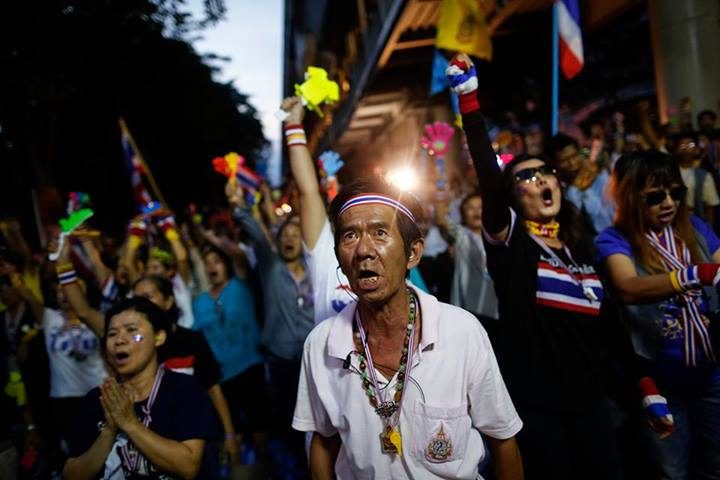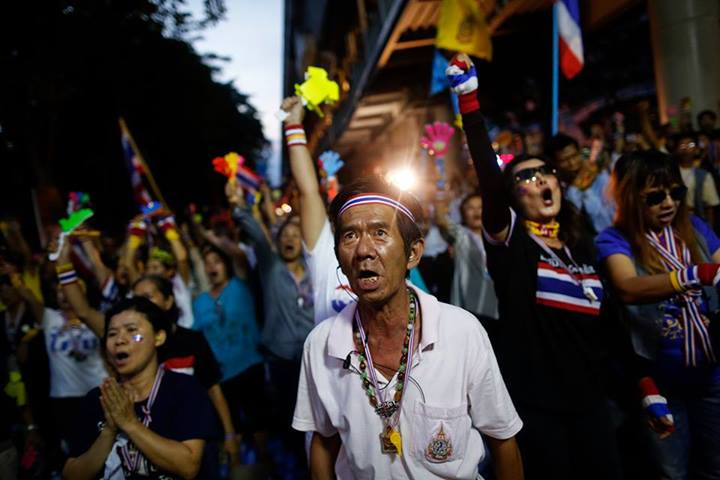Photo by Damir Sagolj
History may not repeat itself very often, but the anti-government protest leader Suthep Thaugsuban repeats his mischievous joke again and again. Today, he announced via all of the national television channels that Thailand’s best politics was first trumpeted at Ratchadamnoen Avenue a few days ago. He called for the transformation of the country into a “real” democratic regime: an Absolute Democracy with the King as Head of State, and the Democrat Party as the government – albeit without any election.
Of course, there are plenty of reasons to oppose or at least doubt his call. It is so obvious that his “mass revolution” aiming to topple Thaksin regime, and replace it with a non-elected moral government, is by no means democracy. The most annoying part of his demeanor, however, is his use of furious and rabid rhetoric as “the voice of the people”, while rejecting the electoral process.
As a matter of fact, the effort to eliminate every single trace of the “Thaksin regime” has been underway since a few years before the 2006 coup, together with the discourse of vote-selling by the “uneducated” rural majority. Yet, one who buys into this vote-selling discourse only does so by also neglecting the observation that there is admittedly lots of money going into elections in many areas even in the southern part of Thailand; the part that has been an important base of the Democrat Party.
Paradoxically, while proposing a non-electoral political system led by the “heavenly selected good people”, with the King as Head of State, the anti-Thaksin movement also fundamentally blames Yingluck’s cabinet for being undemocratic. Yingluck’s cabinet, they argue, is undemocratic because they were elected by the immoral and ignorant majority, who have been singled out by the mainstream media, the educational system, and even academic circles for a long time as a major problem in Thai democracy (Thongchai, 2008).
Although the Thai discourse of vote-buying/selling has been challenged many times (i.e. Callahan, 2005; Bowie, 2008; Walker, 2008), it still retains immense influence among the Thais. Its power has perhaps brought us to the new form of the tale of two cities, or precisely, the two (un)democracies thesis. This thesis is different from the stereotype of the rural and the urban-middle class democracies, as described in Anek Laothamatas’ (1995) thesis of Song Nakara Prachathiptai (two democracies thesis). Anek’s stereotype should no longer be seen as relevant. This is because many social, economic and political conditions have changed, and the discrepancy between the rural and the urban is no longer, and perhaps never, clear-cut. The difference between the two cities actually lies elsewhere. And at this time, where such a difference lies is more explicit than ever.
That is to say, Suthep’s hyperbole of democracy with non-elected “Khon Dee” as the rulers, echoed by his followers, indicates their yearning for an idealistic, moral city. For them, it is the materialist rural dwellers that lack a proper understanding of democracy and sell their votes in exchange for short-term populist policies. The problem with this view is that it is inadequate because money alone does not, on its own, determine election outcomes. However, this awakens us to the fact that many people still desire to live in the daydream of the mythical fictitious prosperous age with the invisible fetters on their feet. It might be understandable they are attracted by such pleasure. However, it is very nauseating and disgusting to compel others to enjoy their pathetic ecstasy.
Arguably, the personalisation of politics of many Thaksin’s supporters may have also enslaved them to a different vision. This vision calls for respecting the equal voices among the people, regardless their wealth, class, or even academic pedigree. Such a vision manifests as another kind of city, the city whose people are guaranteed freedom and rights to determine their own lives, the city in which all can be respected and recognized as the people, not merely the subject of anyone, in particular; of self-proclaimed moral citizens.
In sum, what we are witnessing now is neither the conflict between Red versus Yellow, Thaksin versus Anti-Thaksin, or Rural versus Urban, but the deeply-divided dreams between these two cities. This division is based on the principles of autocracy on the one hand and democracy on the other.
Still, one should not presume that morality is superfluous to democracy. It is only that having a moral discussion on politics in the first place too often leads us up the garden path. It often deceives us into believing that our selves, practices, and sides are better than that of our opposition. Moreover, it entraps us into the illusory myth of goodness, taking us away from considering our possibilities of evil.
The two cities I mentioned are currently under construction. Yet, what we see now might simply be their underlying perennial disagreement.
Phakin Nimmannorrawong is currently completing a Master’s degree in history at Thammasat University, Bangkok
References
AnekLaothamatas. 1995. Song NakaraPrachathiptai [A Tale of Two Democracies]. Bangkok: Matichon Press.
Bowie, K. 2008, “Vote Buying and Village Outrage in an Election in Northern Thailand: Recent Legal Reforms in Historical Context,” The Journal of Asian Studies 67, 2, pp.469–511.
Callahan, W. A. 2005 ‘‘The Discourse of Vote Buying and Political Reform in Thailand,’’ Pacific Affairs, 78, 1, pp.95-114.
Thongchai Winichakul. 2008 “Toppling democracy,” Journal of Contemporary Asia. 38, 1, pp.11–37.
Walker, A.2008 “The Rural Constitution and the Everyday Politics of Elections in Northern Thailand,’’ Journal of Contemporary Asia, 38, 1, pp.84-105.
 Facebook
Facebook  Twitter
Twitter  Soundcloud
Soundcloud  Youtube
Youtube  Rss
Rss 
